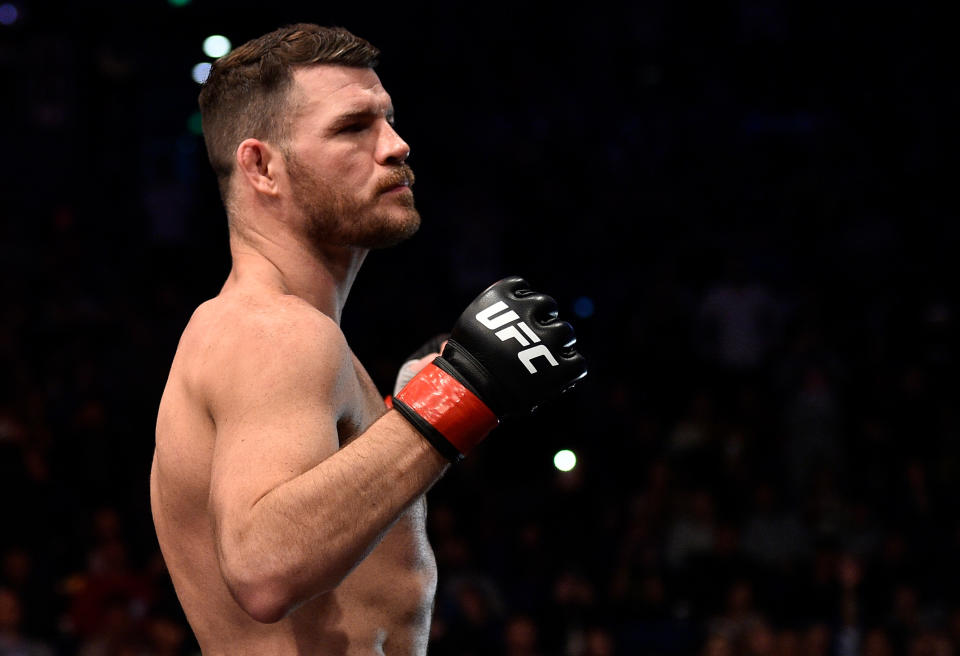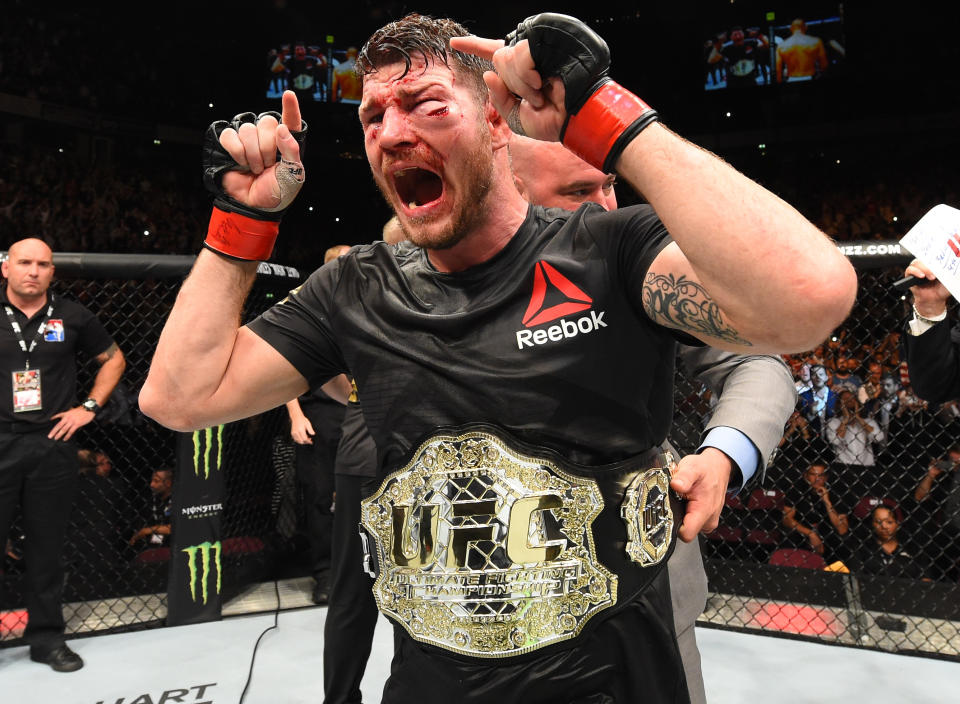Michael Bisping knew when to say when, and the UFC is better for it

Michael Bisping scored one final UFC victory Monday, a more significant one than his stunning and oh-so-epic title-winning knockout of Luke Rockhold at UFC 199 on June 4, 2016.
Bisping’s knockout victory over Rockhold was one of the most improbable wins in the promotion’s history, but it pales in comparison to what Bisping did on Monday for the UFC, the sport and, mostly, his fellow fighters.
He knew when to say when.
Bisping, the ultimate overachiever, announced his retirement on Monday on his podcast “Believe You Me,” walking away from mixed martial arts because of concern for his eyesight.
He leaves the sport with 20 victories, tied with Georges St-Pierre and Donald Cerrone, for most in UFC history, and 29 bouts, tied with Jim Miller for most in UFC history. He was an exciting fighter, as his five Fight of the Night bonuses would attest to, and he innately understood that a fighter had obligations beyond just the work in the cage.
Almost as improbable as his rise to UFC middleweight champion, Bisping became an analyst of some renown, winning a seat on the Fox Sports desk where he helped educate thousands about this still young and growing sport.
But his decision to walk away when he still reasonably could have earned several more major paydays speaks volumes about the man he is and what he means to mixed martial arts.
Fighting is a difficult occupation even in the best of times. There are cuts and bruises and strains and pulls and breaks and all sorts of things that would bring tears and moans of pain to the eyes of so many. And that’s when it’s going good. When it’s bad, well, there have been far too many fighters who paid the ultimate price for doing what they’ve loved.
Fighting has allowed so many men and women to rise out of poverty, to leave desperate circumstances, and to build a great life for themselves and their families.
But it’s also left others – many, many, many others – with damaged brains, unable to speak properly, with limited eyesight and a significantly decreased ability to handle everyday tasks.
Walking away with so much money there for the taking, and with the ability to stand in the center of the cage and hear the crowd roar its approval would have been so easy and, quite frankly, predictable.
Bisping, though, has never been about easy or predictability.
If it had been easy, Bisping wouldn’t have won 20 times in the UFC, nor would he have been world champion. By his performance in the cage, he’s one of the great fighters in the sport’s history. No one who closely follows these things would say he was the most talented, or near the most talented.

He was far from the greatest athlete, nor did he possess that frightening type of punching power that made some so successful. Bisping was a guy who willed himself to a great career, who plumbed the depths of his soul to find whatever it is that propels someone to stand nose-to-nose with the greatest fighters in the world and not take a backward step.
Bisping trained like a demon. He was in shape for every fight, and never took a night off. He never had to give 30 percent of his purse to an opponent because he couldn’t shed those difficult last few pounds. On each night he stepped into the cage, he was the best of what he could have been that night.
Some nights, it wasn’t enough. He was the loser in one of the most famous knockouts in MMA history, a bout at UFC 100 in 2009 when he zigged when he should have zagged and got obliterated by Dan Henderson.
It was as vicious, and violent, of a knockout as you’d ever see, and because it happened so quickly, Henderson was able to hand a massive shot to the out-cold Bisping before the referee could get in to officially call it off.
But it didn’t make him gun shy or rethink his commitment to the world’s most difficult sport. He returned in four months and scored a Fight of the Night victory over Denis Kang at his home in Manchester, England, at UFC 105.
Had he accepted ex-light heavyweight champion Lyoto Machida’s challenge, he would have earned a big check and another potential chip in his Hall of Fame résumé. He’d have made even more had he agreed to a rubber match with Rockhold, his bitter rival.
That all would have been so easy to do, but had he done so, he would have risked his sight. And a blinded fighter is, by definition, risking his life, as well.
All that money, all those cheers, would have meant nothing had Bisping not been able to enjoy a scenic vacation with his family or see his child graduate high school because he lost his sight in a fight he didn’t need to take.
Far too many fighters go on far past their expiration dates. They have various reasons for that, though the most common is that, sadly, they need the money.
There are many fighters who made something out of themselves from nothing, and earned millions in the process. Before becoming great as fighters, they had no idea how to handle their money, and so when they suddenly come into it, they’re not very good at managing it. They spend way more than they need to, or should, and wind up blowing millions upon millions. Then, they fight on, willing to risk their long-term health to reclaim some of what they lost.
Bisping did none of that.
He did it the right way. He took from the sport, made his money and got out at the right time.
He’ll be remembered as one of the most unlikely UFC champions in history, but if even one fighter in a similar situation down the line thinks of the decision that Bisping made and opts to walk away, that will be his greatest achievement.
It was a great career, made greater by the way he so thoughtfully ended it.
More from Yahoo Sports:
• Curry tired of LeBron getting all the credit
• The real reason Kyrie missed Game 7
• Jeff Passan: Why the single is vanishing from MLB
• Michael Lee: How everything nearly ‘splintered’ for the Warriors


